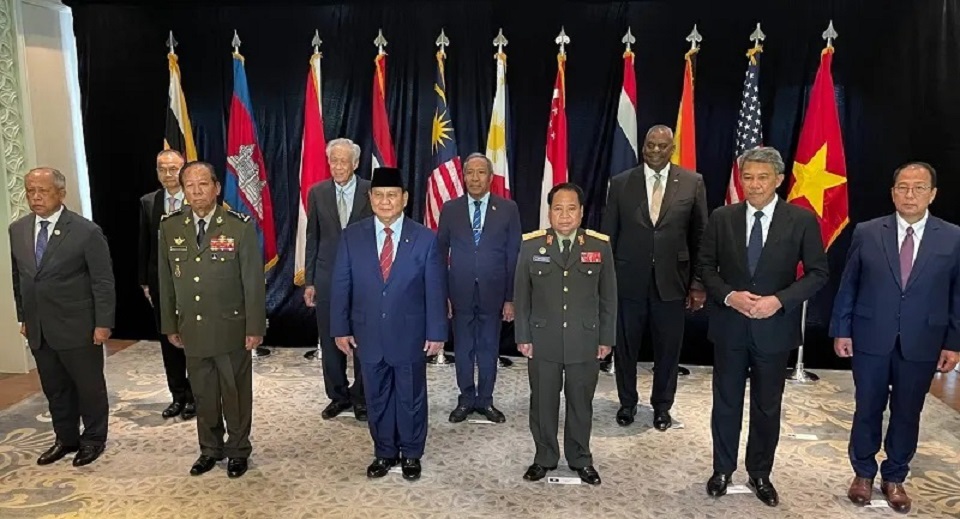Defence minister of China Li Shangfu, has said a cold war mentality is resurgent in the Asia and Pacific region, but Beijing prefers dialogue over conflict.
According to some reports, the large Chinese delegation led by its new Defence Minister Gen Li Shangfu seemed pleased as they headed back home after the three-day Shangri-La Dialogue in Singapore, as their mission was accomplished successfully. The obvious question here is, what did the others think? A number of analyses on the subject by former diplomats, defence experts, academics, media persons, and others have since come out. AICIS too carried two small pieces on this by our Research Team. So, do I have anything different to say today?
I too think the Chinese delegation succeeded in accomplishing what it had come planned to achieve at the forum. That is, to adapt some of their time-tested strategies and create a make-believe narrative and push it with all the force that all the stakeholders start believing in it. That is, well before the start of the Singapore event, China kept voicing loudly that the presence and manoeuvrings of ‘outsiders’ like the U.S. and its allies and partners were creating a dangerous situation in the Asia-Pacific region, particularly in the South China Sea and the Taiwan Strait. They insisted that the U.S. activities in the region would lead to conflict and confrontation, and the situation was fated to spin out of control, creating a potentially devastating scenario in the ‘Asia-Pacific’ and beyond. [Incidentally, it is still ‘Asia-Pacific’, and not ‘Indo-Pacific’ for the Chinese friends!]
China has also been demonstrating how such a possibility could develop in the South China Sea, the Taiwan Strait, and also in the East China Sea, not only in the waters, even using purported fishing vessels, but also above in the skies. The latest such incident occurred when a Chinese naval ship cut across dangerously close to the bow of a US naval vessel as the latter was transiting through the Taiwan Strait even as the Shangri-La Dialogue was in session. This followed a similar unsafe encounter involving the military aircraft of both countries above the South China Sea on the eve of the Singapore event. So, these events were in front of the delegates at the Shangri-La forum as a demonstration of the practical side of the Chinese narrative.
Now, who were the Chinese targeting with their campaign? No, not the U.S., nor the NATO members. In my limited understanding, maybe Australia to a certain extent, and even more so, the doubting Thomases (as the Chinese see it) in the ASEAN. At least to me, Australian Prime Minister Anthony Albanese’s passionate speech about the ‘potential devastation’ in the Indo-Pacific in the event of a U.S.-China conflict was a reiteration, though different in style and intent, of the Chinese narrative. Obviously, he was not asking the U.S. and its allies to wind down from their stand on the issue. Was he naïve enough to ask the Chinese to back out? Clearly, no. He was pleading for the resumption of talks to avoid the feared U.S.-China conflict!
China has never been at ease with the ASEAN closely engaging the West, particularly the U.S., though the grouping was also doing the same with the Chinese. Further, the Chinese, aware of the centrality of the ASEAN in any Indo-Pacific security architecture, want to curb, if not prevent any further deepening of U.S.- ASEAN military cooperation. China’s strategy in the ASEAN has been to drive a wedge among the member countries and win over the vulnerable among them, i.e., if it fails to bring the whole grouping to its side. Moreover, everyone knows that China prefers to deal with individual members of a pack, rather than the group as one, single entity.
The Chinese side seems to believe that it has been able to reinforce the fear in several regional leaders and other stakeholders that the ongoing cat-and-mouse game in the South China Sea and Taiwan Strait will indeed end in a conflict having ‘devastating repercussions, particularly on their economies. China hopes that this fear would help persuade the regional leaders to revisit the situation again, and at least some of them take a more ‘careful’ position on the matter. It will be interesting to watch the impact of the ongoing Chinese propaganda on the type of participation, any change in the nature and objectives, and overall success of the September joint ASEAN military drill planned in, yes, the South China Sea itself.
Tail Piece
An AICIS article a week ago talked about the Chinese propaganda machinery’s achievement in the building yet another narrative that it has been able to sell successfully. That is, the Chinese government assesses that the Ukraine war provided no lessons for its Taiwan occupation plan. As mentioned before, it was bought by many experts, including the authors of the IISS annual report 2023, without any honest questioning! In fact, people, including intellectuals, getting swayed by Chinese narratives is nothing new. Besides those ideologically aligned with the Communist Party in China, there are otherwise intelligent people in every country who start believing in such Chinese narratives after getting influenced by sustained Chinese campaigns. It is wrong to call them all ‘anti-nationals’. As someone said recently, they are simply gullible, their high levels of education notwithstanding.
Disclaimer: The views and opinions expressed by the author do not necessarily reflect the views of the Government of India and Defence Research and Studies
Article Courtesy: Asian Institute for China and IOR Studies (AICIS)
Title image courtesy: US Secretary of Defense





